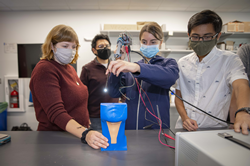
Robotic device for vocal cord surgery
“Surgeons need thinner, more flexible tools so they can perform more of these procedures in their offices and keep patients out of the hospital.”-Professor Loris Fichera, WPI
WORCESTER, Mass. (PRWEB)
October 15, 2021
Worcester Polytechnic Institute (WPI) researcher Loris Fichera has developed a flexible, slimmed-down robotic laser probe for endoscopic larynx surgeries that could reduce recovery time for patients and cut health care spending by shifting procedures from hospitals to doctors’ offices.
“The prototype probe’s thin optical fibers and bendable design allow it to reach small folds of tissue that existing rigid instruments cannot reach, which could expand the number of patients whose larynx pain and conditions could be treated with minimally invasive procedures rather than general surgery,” said Fichera, an assistant professor in the Department of Robotics Engineering. Fichera is developing the new laser probe under a $438,939 two-year National Institutes of Health grant.
“Viruses, injuries, and overuse can damage vocal folds in the larynx, leading to benign nodules or lesions,” Fichera said. “These growths can be removed in the clinic with lasers that are guided into the throat, but surgeons need thinner, more flexible tools so they can perform more of these procedures in their offices and keep patients out of the hospital.”
Fichera’s robotic laser probe is a hollow tube that measures 1 millimeter in diameter and is made from an alloy of nickel and titanium. Laser-cut notches in the tube allow it to bend. Running through the tube are thin optical fibers and a pull wire to steer the device. The robotic probe can be integrated with existing medical endoscopic systems, providing images to the surgeon operating the device.
Fichera and undergraduate WPI students have used computer simulations of human larynxes to develop the probe prototype and are currently testing it on plastic larynx models. WPI is seeking a patent on the technology.
The larynx, also known as the voice box, is a structure of cartilage and tissue at the top of the trachea that produces vocal sounds. Benign tumors of the larynx affect millions of people worldwide and can lead to inflammation of the voice box and complications such as difficulty swallowing, singing, and speaking.
Lasers have been used for decades to remove growths from larynx tissue and seal blood vessels, but procedures can be challenging to perform because vocal folds are small and exist deep in the larynx.
Fichera focuses on using robotics and computer science to improve medical procedures. WPI researcher Yuxiang Liu, assistant professor in the Department of Mechanical Engineering, and Dr. Thomas Carroll, assistant professor at Harvard Medical School, are collaborating on the robotic laser probe project.
About Worcester Polytechnic Institute
WPI, a global leader in project-based learning, is a distinctive, top-tier technological university founded in 1865 on the principle that students learn most effectively by applying the theory learned in the classroom to the practice of solving real-world problems. Recognized by the National Academy of Engineering with the 2016 Bernard M. Gordon Prize for Innovation in Engineering and Technology Education, WPI’s pioneering project-based curriculum engages undergraduates in solving important scientific, technological, and societal problems throughout their education and at more than 50 project centers around the world. WPI offers more than 70 bachelor’s, master’s, and doctoral degree programs across 17 academic departments in science, engineering, technology, business, the social sciences, and the humanities and arts. Its faculty and students pursue groundbreaking research to meet ongoing challenges in health and biotechnology; robotics and the internet of things; advanced materials and manufacturing; cyber, data, and security systems; learning science; and more. http://www.wpi.edu
Share article on social media or email:

